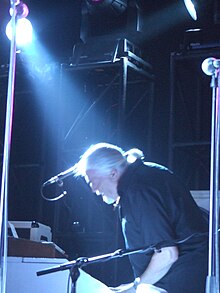Jon Lord
| Jon Lord | |
|---|---|

Lord, on stage for The Sunflower Jam, in 2007
|
|
| Background information | |
| Birth name | John Douglas Lord |
| Born |
9 June 1941 Leicester, England, United Kingdom |
| Died | 16 July 2012 (aged 71) London, England, United Kingdom |
| Genres | Rock, hard rock, heavy metal, blues rock, progressive rock, classical, jazz, jazz fusion |
| Occupation(s) | Musician, composer |
| Instruments | Keyboards |
| Years active | 1960-2012 |
| Labels | Purple, EMI, Harvest |
| Associated acts | Deep Purple, Whitesnake, Paice Ashton Lord, The Artwoods, The Flower Pot Men |
John Douglas "Jon" Lord (9 June 1941 – 16 July 2012) was an English composer, pianist, and Hammond organ player known for his pioneering work in fusing rock with classical or baroque forms, especially with Deep Purple, as well as Whitesnake, Paice Ashton Lord, The Artwoods, and The Flower Pot Men. In 1968, Lord co-founded Deep Purple, a hard rock band of which he was regarded as the leader until 1970. Together with the other members, he collaborated on most of his band's most popular songs. He and drummer Ian Paice were the only continuous presence in the band during the period from 1968 to 1976, and also from when it was reestablished in 1984 until Lord's retirement from Deep Purple in 2002. On 11 November 2010, he was inducted as an Honorary Fellow of Stevenson College in Edinburgh, Scotland. On 15 July 2011, he was awarded an honorary Doctor of Music degree at De Montfort Hall by the University of Leicester. Lord was posthumously inducted into the Rock and Roll Hall of Fame on 8 April 2016 as a member of Deep Purple.
Lord was born in Leicester on 9 June 1941 to Miriam (1912–1995; née Hudson) and Reginald Lord, growing up at 120 Averill Road and retaining a strong bond with the city throughout his life. His father was an amateur saxophonist and encouraged Lord from an early age. He studied classical piano from the age of five, with a local teacher, Frederick Alt, and this focus on a classical grounding to his material was a recurring trademark in his work, both in composition, arranging and his instrumental solos on piano, organ and electronic keyboards. In particular his influences ranged from J. S. Bach (a constant connection in his music and his keyboard improvisation) to Medieval popular music and the English tradition of Edward Elgar. He attended Wyggeston Grammar School for Boys between 1952 and 1958 where he gained O Level passes in French, music and mathematics, participated in amateur dramatics and the school choir alongside his organ and piano studies and then worked as a clerk in a solicitor's office for two years.
...
Wikipedia
